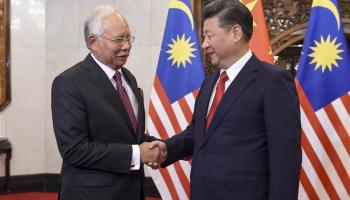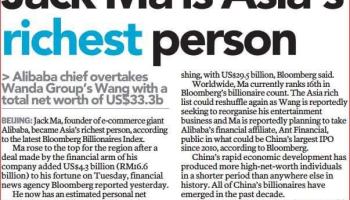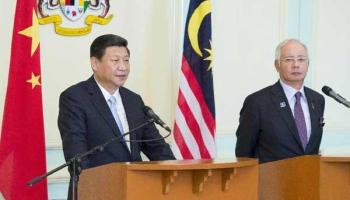May the goodwill generated from the Middle Kingdom’s investments coming our way be infectious.
NO doubt about it – the love is back. MCA is basking in its renewed affection and appreciation as a useful partner to Barisan Nasional.
That was supremely obvious in Prime Minister and BN chairman Datuk Seri Najib Tun Razak’s glowing speech at MCA’s annual general assembly on Sunday.
In the three years since the devastating general election in 2013, MCA has worked hard at rebuilding itself and has regained some of its mojo.
And it showed at this year’s assembly, which was very different from the mood and tone of the AGM post-GE13, when the party was still smarting from the anger and disappointment of its coalition partner.
Najib, feeling terribly let down by the lack of Chinese support, had lashed out at the community, calling their massive support for the Opposition a “Chinese tsunami”.
Not only that, he defended a Malay newspaper’s front-page headline: Apa lagi Cina mahu? (What else do the Chinese want?).
That year at its annual general assembly, he pointedly told MCA, whose parliamentary seats had been reduced to a mere seven and state seats to 11, half of what it won in the 2008 general election, that it needed “political Viagra” to raise its flagging spirit.
It was indeed a horribly low point for MCA. There were calls for the party to leave BN, but the leadership soldiered on, refusing to give up a long-established partnership.
A year later, at the MCA AGM, Najib did not mince his words again when he urged the party delegates to stop fighting among themselves because he found the factions confusing and tiresome.
All that has changed. On Sunday, he declared that there was no more Team A or B, only Team MCA, in recognition of Datuk Seri Liow Tiong Lai’s leadership in bringing unity and transforming the party.
But there was another feel-good factor at work at the AGM: the afterglow from Najib’s successful visit to Beijing a week earlier.
The Chinese government really rolled out the red carpet for Najib and his delegation, which included Liow, MCA deputy president Datuk Seri Dr Wee Ka Siong and other MCA leaders, during a six-day visit that netted investment deals amounting to RM144bil, covering bilateral trade, education, culture and defence.
Beijing’s warm relationship with Putrajaya and China’s position as Malaysia’s largest trading partner did not happen overnight.
China has always remembered Malaysia for being the first Asean country to establish diplomatic relations with it when communism was still seen as a threat to the region.
That was thanks to Najib’s father, second Prime Minister Tun Abdul Razak Hussein, who made that historic visit in 1974.
But it was the Malaysian Chinese community that went on to deepen and strengthen those ties. Again, this is something China remembers and is grateful for: Malaysian Chinese businessmen who invested in China in the late 1970s when Deng Xiaoping had just opened its doors to foreign investment.
Among them is the stellar tycoon Robert Kuok, said to wield great influence with the Chinese leadership, whose long-standing admiration for him culminated in CCTV, China’s state TV broadcaster, bestowing on him the China Economic Person of the Year Lifetime Achievement Award in 2012.
Among the stories told include how Kuok earned the Chinese government’s trust and affection after he, the renowned Sugar King, secretly helped China overcome a severe sugar shortage in the early 1970s.
Interestingly, when Chinese leaders visit Kuala Lumpur or Singapore, they invariably choose to stay at Kuok’s Shangri-La hotel and that includes former president Hu Jintao and his successor, Xi Jinping, which is surely a measure of their continuing esteem for Kuok.
While the magnitude of the new investment deals raised eyebrows, China’s getting involved in building and funding major infrastructure projects isn’t new. After all, it was a Chinese construction company, CHEC, and a cheap Chinese government loan that helped build the second Penang bridge.
Granted, people have the right to be cautious and demand to know the details of such deals, and that should be respected. But there is no doubt that China has come to the rescue of Malaysia at a time when our economy needed a huge boost.
More importantly, Najib’s administration knows the role MCA leaders played in helping seal the deals.
After all, many of the MoUs signed concerned the development of transport infrastructure like the East Coast Rail Link and ports, which are under Liow’s portfolio as Transport Minister.
As reported, Liow made frequent trips to Beijing for meetings and wooed the Chinese to invest in Port Klang. Not only that, he was always on hand to host visiting Chinese dignitaries, like his counterpart Yang Chuantang, and Prime Minister Li Keqiang.
All the hard work came to fruition with the huge investments and the affirmation of trusted friendship between the two nations.
As Najib said, he continued to look east, like former prime minister Tun Dr Mahathir Mohamad’s Look East policy, because China was the world’s biggest economy. But frankly, there isn’t any other direction to look for big investment.
The realisation of China’s importance to Malaysia is fast taking root; so much so, the Red Shirts which, just a year ago tried to storm Kuala Lumpur’s Chinatown, have stopped their outright anti-Chinese attacks after Ambassador Dr Huang Huikang made it clear that Beijing would not stand for “incidents which threaten the interests of the country, infringe upon the rights of its citizens in doing business, or disrupt the relationship between Malaysia and China”.
But now that Najib has warmed up again to MCA and the Chinese from China are all the rage, it would really, really be nice if that love and goodwill could be spread around to Malaysian Chinese who have long invested in this place they call home and helped build it into a modern, progressive, successful nation.
It is time to stop making the Chinese community the convenient whipping boy and the bogeyman to frighten the Malays for political expediency. And no more allowing groups and individuals to spew hate speech and dangle the threat of another May 13.
This type of divisive politics has gone so bad that Liow reiterated his call for a National Reconciliation Council to strengthen the two pillars of national unity and cultural diversity, which he said had come under attack.
That is what is sorely needed to improve MCA’s chances of winning back the Chinese vote in the next general election, which is Najib’s ultimate challenge to the party.
As the joke that is going around now: no point telling the Chinese to balik Tongsan (go back to China) because Tongsan is coming to Malaysia.
 By June H.L. Wong, So Aunty, So What? The Star/Asian News Network
By June H.L. Wong, So Aunty, So What? The Star/Asian News NetworkAunty was determined not to write about Donald Trump but she must mention she was gobsmacked by his five-year-old granddaughter’s ability to speak Mandarin.
Related posts:
 China tops global fintech rankings
China tops global fintech rankings

Many of the negative responses over the deals with China seem to be
politically motivated, stemming from ignorance and, in some cases,
et...

https://youtu.be/fb74uSG-7Ro China-Malaysia Promising relationship: Najib delivering his speech in Beijing. ‘A digital economy with e...
 Keep China's faith in us; Relationship with China is crucial, says expert
Keep China's faith in us; Relationship with China is crucial, says expert
Prime Minister Datuk Seri Najib Razak (L) and China's Premier Li
Keqiang at the Great Hall of the People, in Beijing. - EPA
Malaysian PM Najib given official welcome at China's Great Hall of the People https://youtu.be/v87tJF3uO7U Prime Minister ...

 That is what is sorely needed to improve MCA’s chances of winning back the Chinese vote in the next general election, which is Najib’s ultimate challenge to the party.
That is what is sorely needed to improve MCA’s chances of winning back the Chinese vote in the next general election, which is Najib’s ultimate challenge to the party.
 Pivotal moment: The PM in talks with President Xi Jinping during a meeting at Diaoyutai state guesthouse in Beijing.
Pivotal moment: The PM in talks with President Xi Jinping during a meeting at Diaoyutai state guesthouse in Beijing.









